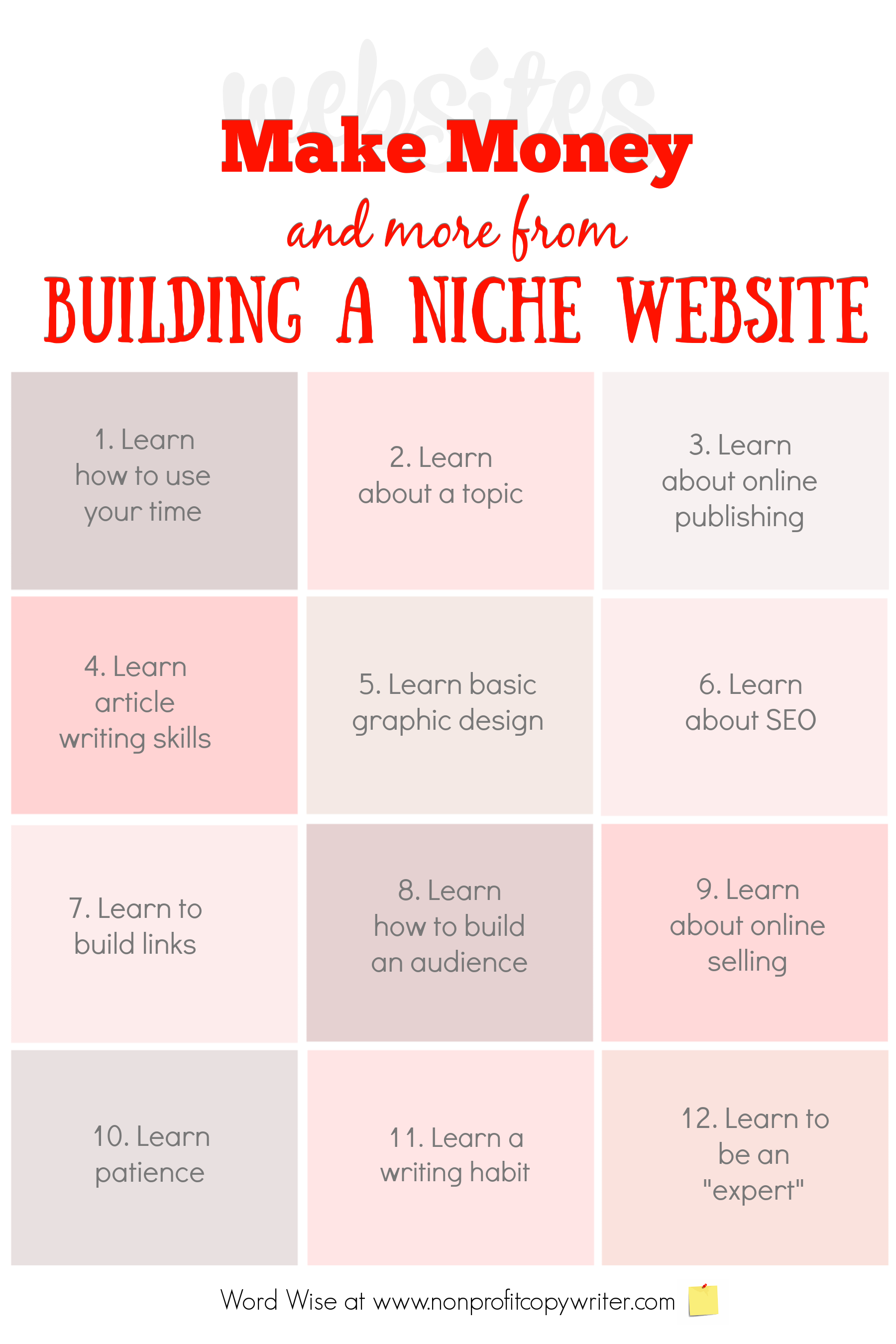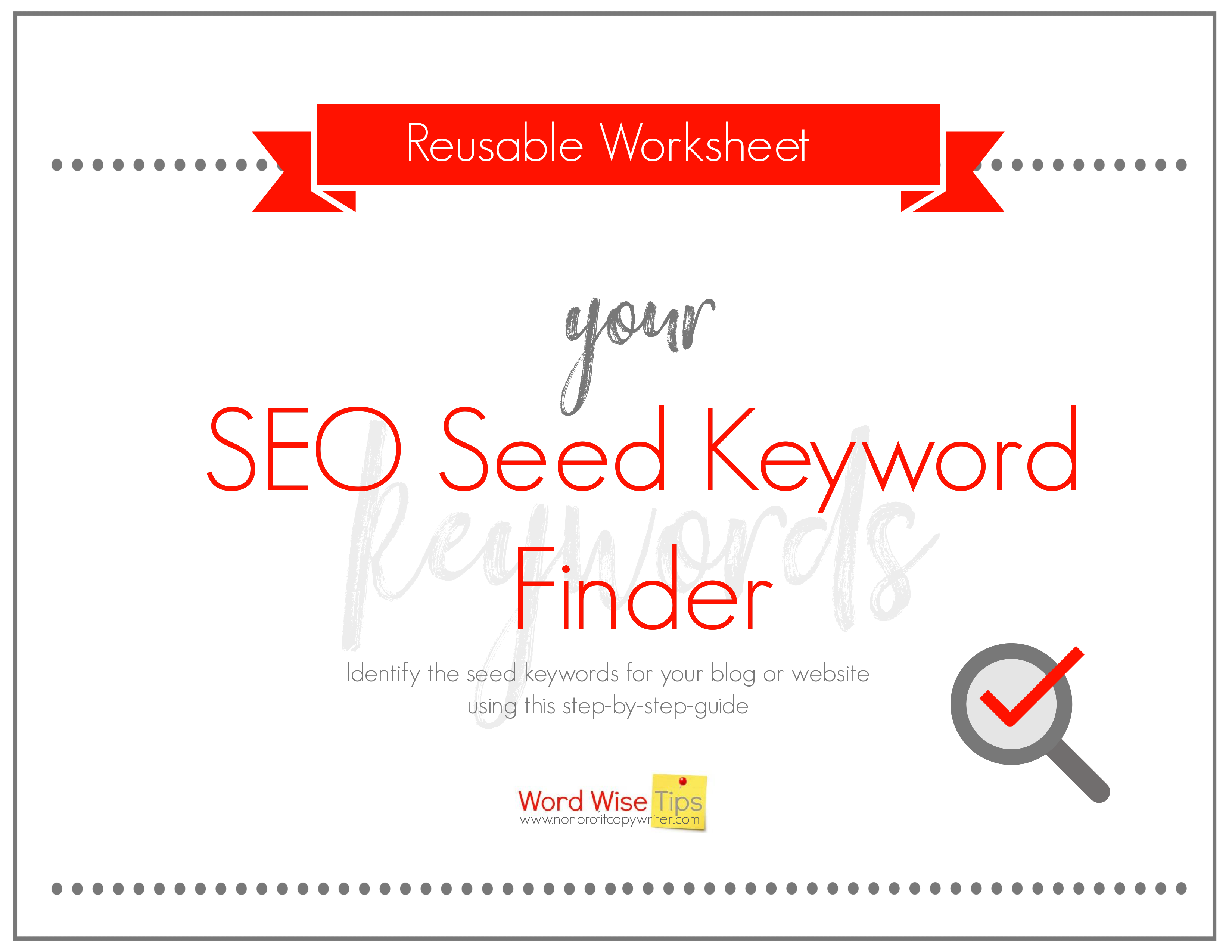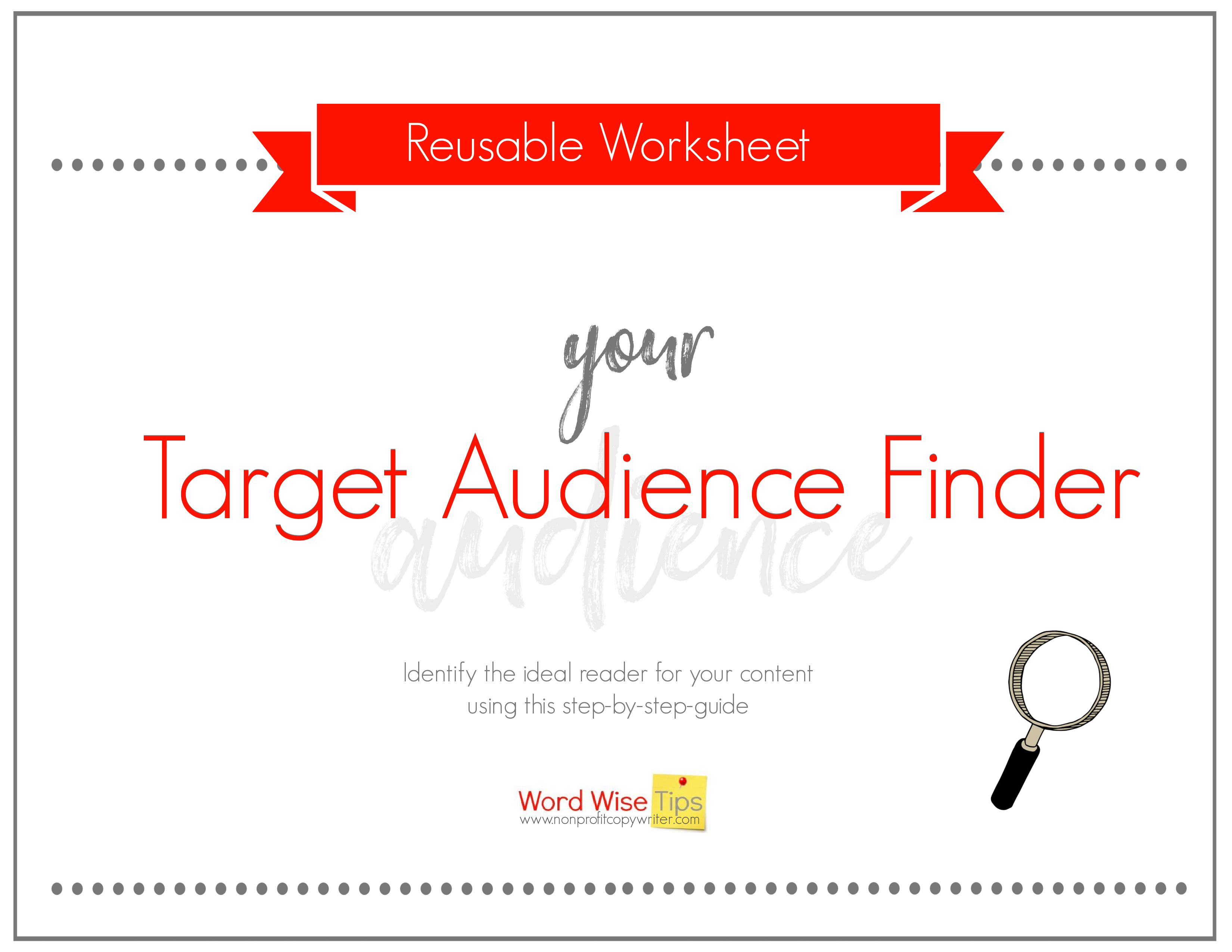Save Time: Get 5 Simple Writing Tips
you can put to use in 10 minutes
Building a Niche Site? Here’s What To Expect
Award-winning writer Kathy Widenhouse has helped hundreds of nonprofits and writers produce successful content , with 750K+ views for her writing tutorials. She is the author of 9 books. See more of Kathy’s content here.
Updated 9.5.25
You’re chomping at the bit to get started building a niche website. Oh, you’ve heard writers rave about the fun it is to write about a topic you adore … the followers and credibility you gain from a niche site… and most of all, the money you can earn.
All of it is true. Yet apart from notoriety — and, yes, a bigger bank account — building a niche website offers additional, enduring benefits.
What is a niche website?
A niche website is a blog or website that caters to a highly specialized market. The site offers quality information and resources about a specific topic.
It attracts visitors who are interested in that subject. This small segment of readers shares a common, narrow interest, whether it’s futuristic game coding or preschool crafts or pickleball for seniors. Subsequently, these users buy products and services from links on the niche website. The site owner receives commissions or fees.
What I learned from building a niche website
I joined the niche site owner bandwagon in 2010 and have successfully operated three niche websites since then. My niche sites have provided me with the freedom to enjoy writing on my terms. And yes, the monetary rewards have been gratifying. Proceeds from one of my niche sites, Tomato Dirt, provided living expenses for our daughter while she was in medical school and for our son while he was in law school.
Total disclosure: I was prepared before I jumped in. I created my first niche website after I participated in Nick Usborne’s Money-Making Websites course. Nick explained how to go about finding a topic, how to get started building the site, how to add content consistently over time to build readership, and how to make money at it. And he was crystal clear: you could invest just a few hours a week in building your niche site and be successful … but you needed to be consistent with investing that time over the long haul.
Yet even with all the handholding I received while taking the course, I’ve learned plenty of additional, long-lasting lessons from building my niche websites.
The biggest thing to expect when building a niche website
Lesson #1: building a niche site takes time. Lots of it.
“Building up a successful niche site can take years. Scratch that. Will very likely take years,” says Jon Dykstra at Fat Stacks blog, who has published 16 niche websites that earn him thousands of dollars a month. “Not 20 years mind you. More like two to five… depending on how much time you put into it and how you go about it.”
- It takes time to choose a saleable topic.
- It takes time to create a site and its brand.
- It takes time to write quality content.
- It takes time to create graphics for each page.
- It takes time for search engines to recognize your site.
- It takes time for readers to find you.
- It takes time to continue to add and update content.
If you are willing to invest the time it takes to build a niche website, then you will acquire other goodies along the way.
What else to expect when building a niche website
Lesson #2: you will learn a lot about your topic.
A niche website addresses a specific need, want, problem, activity, hobby, pursuit, or profession. You will invest considerable time in building a niche website, so you want a site topic that can be profitable. That means you need to be willing to learn about a subject that’s not the top dog in your wheelhouse.
Let’s say your true love is the origin of words — etymology. Your heart is set on creating a niche site on word derivation. But your site concept research reveals low search numbers and low numbers of in-demand keywords for that topic — and minimal opportunity for monetization. Little interest translates to low opportunity for traffic and less opportunity for income. So you ditch the etymology niche site idea.
While you may not be able to create a profitable niche site about your #1 passion, you can find a related topic that can flourish. When I searched for my first niche site concepts, I investigated plenty of topics that interested me: quilting, the Bible, walking, flower gardening. Some were too broad. Others reflected low search numbers. Still others had plenty of quality competition already. After a few weeks, I was discouraged … until the day my husband came indoors from the vegetable garden. “Our tomato plants have a disease on their leaves,” he told me. “And I can’t find a good website specifically about growing tomatoes that can help me. Information about tomatoes is scattered everywhere across the Internet.”
That comment led me to research competing vegetable gardening websites and keywords and online information about tomatoes. As a result, I launched Tomato Dirt. The topic is related to one of my interests: flower gardening. And you can bet I’ve learned plenty about tomatoes — and gardening — since I started the site.
Lesson #3: you will become an online publisher.
If you’re building a niche website, you need to learn to manage an online content management system (CMS). I’ll make this easy for you. WordPress is the CMS of choice for more than 40% of the websites on the web, followed by Squarespace. I’ve used both successfully in my client work. But when it came to choosing a platform for building a niche website on my own, I chose SBI (SoloBuildIt).
The reason is simple: SBI was created specifically as an “all-in-one” solution for everyday people to use to build a successful solopreneur niche website. SBI offers a website builder, a 10-Day Action Guide, online help, an active community of users, email addresses, newsletter capability, plus a built-in niche selector that guides you through the process of choosing keywords and a profitable site concept. Choosing SBI reduced my niche website learning curve.
Lesson #4: you will become efficient in writing articles.
A successful niche site has dozens — even hundreds — of articles. Each page on your site operates as an article with a specific slant, whether it’s a pillar post or a piece of short-form content. Even if you’re already a writer, you’ll become ultra-proficient at writing articles because you’ll produce so many of them. Along the way, you’ll learn efficient ways to research … gather facts, anecdotes, quotes, and stories … write an article outline … write powerful headlines and subheads … write a hook to pull in your readers … write the article body persuasively to make a point … write a strong ending with a useful, practical takeaway.
Lesson #5: you will become a graphic designer.
The most appealing web pages offer one image for every 300–400 words. Sure, you can add free stock photos from Unsplash or Pexels or Pixabay. But so does everyone else. A successful niche site offers graphics that are customized to your content. You can use PicMonkey or Canva to create personalized low- or no-cost images — and your niche website will exceed others.
Lesson #6: you will become SEO-proficient.
Since SBI provides me with a list of keywords for my niche websites, I thought I could skip the process of learning SEO. And for a while, I did. SBI’s Brainstormer tool was enough while I built foundational content.
But online trends change. Readers’ search habits shift. As my sites grew, I needed to understand SEO — the process of creating a page for the web to return strong search results. Was I intimidated? Sure. But I found LeAnn Fox’s free, introductory SEO course. to be a helpful foundation. You may not need to learn about SEO right out the gate but expect to spend time with it along the way. Another plus: SEO is a marketable skill for a writer.
Lesson #7: you will become a link builder.
You want plenty of visitors to find your niche website, right? They do so through links. For your niche website to succeed, you need 3 types of links:
- Inbound links (links from another site to yours, which generate traffic and build your site’s credibility.)
- Internal links (links from one page on your website to another page on your website, which build reader loyalty and improve bounce time.)
- Outbound links (links from your site to another site, chosen carefully to give readers a better user experience and build authority.)
Lesson #8: you will learn ways to grow an audience.
A thriving niche site does more than sit in the background gathering dust. The most successful site owners keep content fresh with page updates. They interact with readers in email newsletters, on social media, and through special offers. As your site grows, expect to develop email marketing and social media skills.
Lesson #9: you will become a marketer.
“How do you monetize a niche site?”
“How does a small niche website become profitable?”
You’ll find out the answers to those questions when you build a niche website. At the very least, you’ll become an affiliate marketer — a publisher who promotes other people’s products or services and earns a commission on each sale. Amazon Affiliates and Google AdSense are two of the most common affiliate partners, but you can also find others in your specialized niche. For instance, Tomato Dirt partners with Burpee, Gardener’s Supply Company, and TomatoFest as an affiliate.
Beyond affiliate commissions, your niche site can make money through ads, sponsored posts, and selling your own digital or physical products. Along the way, you’ll find you’re no longer just a writer. You’re also a publisher and a marketer.
Lesson #10: you will become more patient.
A niche site is not a “get rich quick” scheme. Once I chose my site concept for Tomato Dirt, I worked systematically to build solid content. I avoided posting ads to the site for six months so as not to sway Google that I was “only in it for the money.”
Yet while I practiced restraint in monetizing the site, I was impatient on the back end. I watched my site statistics every day. That was a mistake.
May I suggest you avoid my boo-boo — unless you wish to go bonkers as you fluctuate from extreme elation one day to utter despair the next. Ditto for watching your number of email subscribers too closely. Instead, force yourself to be patient and look at overall trends. Check your site numbers weekly (or better yet, monthly). Use the extra time to write another page or two of quality content.
The longer I have owned Tomato Dirt and my other sites, the more patient I have become. For two years I worked to add at least a page a week to my niche site, trusting those who explained that quality content earns views and followers, and clicks. They were right. One day I checked my bank statement and noticed a four-figure deposit from affiliate income. Patience pays off. Literally.
Lesson #11: you will build a writing habit.
After several years of Tomato Dirt’s success, I slacked off. I went through a season in which I added little content and updated even less of it — with good reason, as I was working on other projects.
But the site’s profits reflected that neglect. The good news? Once I resumed creating and updating content each week, my profits rose once again. These days, adding to my niche site regularly has become a habit.
One thing you may not expect when you’re building a niche site
Lesson #12: you will become an expert.
Look at any successful niche website and you may automatically think that the writer is an authority in the field. All that luscious content must spew from someone who knows a lot about the subject. Or maybe, you think, they hired an expert to write it.
But what if the site owner wasn’t an authority on the topic when starting out? He took the time to learn about the subject matter. He became an expert by writing the site.
Likewise, you will invest hours in your site. You conduct honest research and work hard to produce quality content, which means you learn and grow right along with your site. After a few months (or years), you accumulate pages and pages of valuable information. As that content amasses, you may not feel like an authority in your field. But because you’ve done the work, you know more about your topic than the average reader. You have created a nice piece of intellectual property. Your site becomes a resource for others. Which means you do, too.
I’m certainly not a horticultural authority on tomatoes, but I know a good deal about growing them in the home garden. And I am thrilled to share that information with other gardeners and gardener-wannabes.
What not to expect when building a niche website
“How do I start a niche site in under 3 hours?” I chuckle to myself when I read that question from my readers. Naturally, you can throw together a website template quickly these days, especially with all the WYSIWYG tools that are available.
But if you’d like to build a niche website with staying power, then plan to invest more than 3 hours — or 3 days, 3 weeks, or even 3 months. A profitable, money-making website is a long-term project.
Yet when you stay with it over time, the rewards are financially tangible — and more. Along the way, you’ll build marketable skills like writing, graphics, and SEO, and publishing. Your work habits and patience deepen. And you become a friendly, online expert your readers can trust.
More about building a niche website
What Is a Niche Site? Consider Building One For Fun and Profit ...
Should You Build a Niche Website? Take This Quiz to Find Out ...
Don’t Be A Writer For Everyone. Choose Your Niche Audience...
What are Your Content Pillars?
3 Ways You Can Make Money Writing Content on Your Own Site ...
Make Money As a Writer When You Specialize and Sub-Specialize ...
Review: Website Hosting with SBI (Solo Build It) ...
More Website Writing Tips on our Pinterest board ...
Return from Building a Niche Website? to Nonprofit Copywriter home
As an Amazon Associate I earn from qualifying purchases.
Share This Page

Named to 2022 Writer's Digest list
BEST GENRE/NICHE WRITING WEBSITE


Stop Wasting Time!
Grab your exclusive FREE guide, "5 Simple Writing Tips You Can Put to Use in 10 Minutes or Less"















